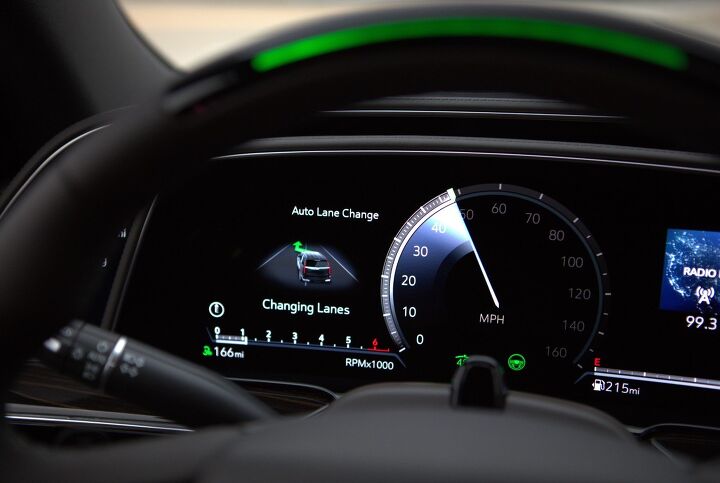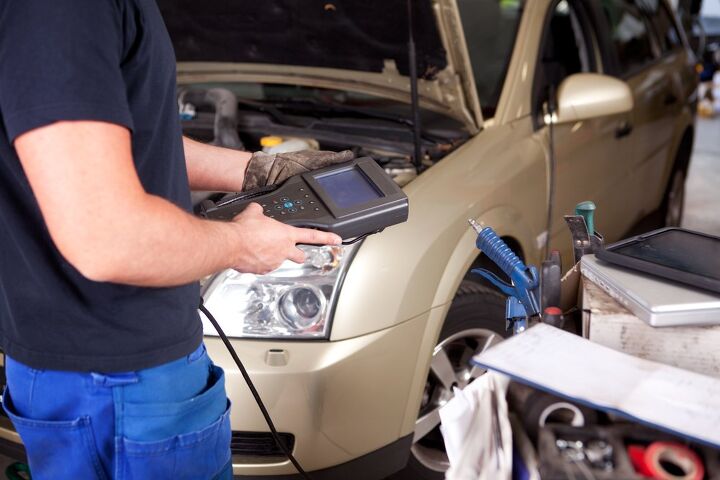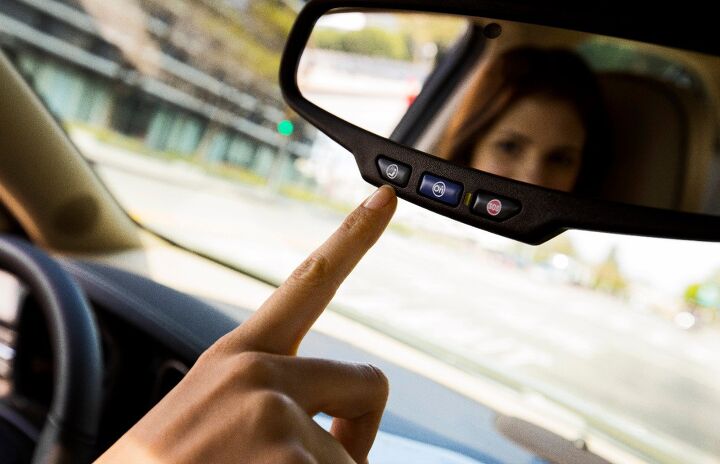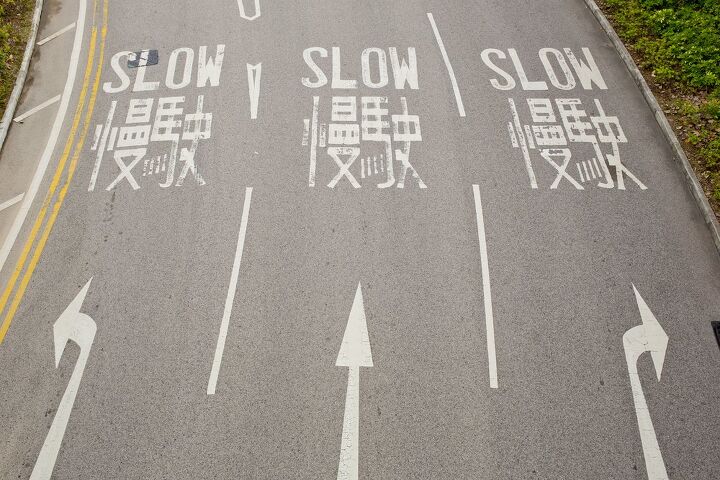#DrivingData
IIHS Takes a Dump on Semi-Autonomous Cars, Then Impositions Drivers
The Insurance Institute for Highway Safety (IIHS) has said it is developing a new rating system to evaluate the existing safeguards found inside vehicles equipped with partial automation. Considering how commonplace advanced driving aids have become, you might be thinking this was long overdue. However, insurers were blindly praising advanced driving suites a few years ago — until they actually started testing them in earnest.
As luck would have it, there’s been mounting research supporting claims modern automotive tech encourages drivers to tune out and become distracted. While this wouldn’t be a big deal if the relevant features all functioned perfectly, the reality is that most are far less effective than advertised and practically all of them run the risk of being completely undone by inclement weather or poor lighting. Confusingly, the IIHS believes the best solution here is to make sure systems constantly monitor the driver to ensure the driver is constantly monitoring the system.
Driving Dystopia: Stellantis Is Becoming a Software Company Like Everyone Else
On Tuesday, Stellantis announced a plan to cultivate €20 billion ($23 billion USD) per year by 2030 via “software-enabled product offerings and subscriptions.” However, the automaker will first need to increase the number of connected vehicles it has sold from 12 million (today) to 34 million by the specified date.
This is something we’ve seen most major manufacturers explore, with some brands firmly committing themselves to monetizing vehicular connectivity through over-the-air (OTA) updates, data mining, and subscription services. Though much of this looks decidedly unappetizing, often representing a clever way for companies to repeatedly charge customers for equipment that’s already been installed.
Report: The Government Is Already Using Connected Cars to Spy on You
A recent report from The Intercept has confirmed some of our biggest fears about connected vehicles. Apparently, U.S. Customs And Border Protection (CBP) has struck a deal with Swedish mobile forensics and data extraction firm MSAB for hardware that allows the government to not only siphon up vehicle data but also use it as a backdoor to access the information on your phone.
While this shouldn’t be all that surprising in an America that’s seen the Patriot Act pave the way for all sorts of government spying, the arrangement represents another item in a toolbox that’s frequently used against regular citizens. CBP is alleged to have spent $456,073 on a series of vehicle forensic kits manufactured inside the United States by Berla. Internal documents suggest that the system was unique and of great interest to the U.S. government, with a multitude of potential applications pertaining to automotive data. But what surprised us was just how much information carmakers thought their products needed to keep tabs on and how that plays into this.
Driving Dystopias: GM Reportedly Rejoining the Insurance Racket With OnStar
General Motors is making moves to offer insurance plans under its data-focused OnStar connected services, which is convenient since the feature comes equipped on all new models the company sells inside North America. Participating customers will be required to allow the automaker to track their driving behavior in real-time. As a perk for handing over their right to privacy, GM will offer discounts to motorists that never exceed the speed limit or accidentally roll through a stop sign.
It’s part of a usage-based insurance trend that’s becoming increasingly common within the industry. It started years ago with customers agreeing to have insurers install tracking devices in their vehicles in exchange for lower rates — assuming they displayed what the agency deemed safe driving practices throughout the duration. But, now that cars are becoming connected to the internet, this can be done automatically with on-board technologies. Consumer advocacy groups are growing worried that insurers will eventually make vehicle tracking mandatory and use it as an excuse to issue predatory fees.
Frankly, so are we.
Consumer Advocacy Group Demands Driving Data Be Controlled by Drivers
The Global Alliance for Vehicle Data Access (GAVDA) has issued a letter to automotive manufacturers around the world to request consumers be given direct access to the data generated by the vehicles they drive. While the group is comprised of organizations representing rental agencies, car sharing, independent vehicle repair shops that also want access to the information, it’s likewise backed by several consumer advocacy groups that worry customers and small businesses are being taken advantage of.
At the core of the letter is a refutation of claims made in a June 3rd memo the Alliance for Automotive Innovation (AAI) sent to Congress. That group is an assemblage of the world’s largest industry players with an aim to monetize driving data as quickly as possible. It just so happens that the duo are diametrically opposed to how the government should handle user information.
The Hero We Need: Consumer Access to Repair Coalition
When it comes to activism, it’s best to choose your battles carefully. Fortunately, there aren’t too many causes within the auto industry and most are easy to get behind.
Even though environmental activists sometimes find themselves at odds with reality, their hearts are usually the right place, and they’ve encouraged automakers to try new and interesting things with transportation. Safety advocates can likewise go overboard, but we wouldn’t have seen cars get dramatically safer (or heavier) since the 1970s if they hadn’t.
Our favorite has to be consumer advocacy, however. With the exception of the occasional predatory lawsuit looking to take advantage of a dumb corporate decision, there’s precious little to scoff about. It also tends to overlap with our pet peeves by decrying bad business practices within the industry. Case in point, the Consumer Access to Repair Coalition has recently asked Congress to rethink how vehicular data is shared — noting that automakers shouldn’t need real-time monitoring for repairs and that the technology likely poses an unnecessary security risk.
California's Data Privacy Laws Could Stymie Auto Industry's Long-term Plans
Pretty much anytime automotive data acquisition becomes the topic of discussion, we have to take time to mention customer protections and ask where the line for privacy should be drawn. With social media firms making a mint off the process online and automakers conducting major moves to likewise leverage personal data, it’s practically a nervous tic at this point.
Hoping to get out ahead of some of the potential problems arising from issue, California enacted new consumer protection laws that came into effect at the start of the year.
The California Consumer Privacy Act (CCPA) aims to give individuals greater control over the personal data being harvested. Most of this is supposed to be done by allowing consumers to request what kind of information is being collected, ask where it’s going, and the ability request that the subsequent sale or continued acquisition of personal data cease. However, CCPA contains provisions for customers to ask a company to delete all information it has stored on them, as well as rules prohibiting any discrimination related to a person exercising their privacy rights.
Frankly, it all sounds rather good to someone who prattles endlessly about data privacy rights, but it’s also causing problems for the automotive industry.
Report: Connected Cars Already Know Everything About You
Vehicular privacy is one of those things we never thought we’d have to gripe about but, as automotive connectivity becomes the norm, it’s become one of the most nagging issues in the industry.
Taking a cue from tech giants like Google, Facebook, and pretty much every other website you’ve ever connected to, automakers have begun leveraging customer data on a massive scale. Always-on internet connections exacerbated this problem (feature?), but it’s extremely difficult to tell exactly what kind of information is being shot up into the cloud before ending up at a manufacturer’s data center.
While we’ve seen cars hacked for the purpose of assessing how they’d stand up to malicious entities bent on wreaking havoc, few have attempted to decode the surplus of information emitted by your vehicle. We know this because people would probably be pretty upset to learn of the pathetic level of anonymity currently afforded to them. Despite spending tens of thousands of dollars on a new vehicle, privacy is rarely considered standard equipment.
Toyota Thinks Connected Wiper Data Can Improve Weather Forecasts
Toyota and Japanese weather information provider Weathernews Inc. have been running tests aimed at improving the accuracy of rain forecasts by using driving data from connected cars — or, more specifically, their windshield wipers. Based on the assumption that wiper operations correspond with the presence of precipitation, matching the severity to speed settings, the pair feel they can leverage customer information to close info gaps created by low-altitude rain clouds that are difficult to track.
With an official announcement issued earlier this month, both companies are framing this as an effective way to bolster roadway safety and offer new services to its customers. But it also raises the usual round of privacy concerns re: connected vehicles, while potentially offering some interesting and useful features — like localized flood warnings and other traffic advisories.
True Potential? OnStar Updated With Fleet Management Service
With automotive connectivity kicking down the door to new sources of revenue, General Motors’ OnStar has already undergone a few changes since its debut in 1997 model-year Cadillacs. We’ve criticized some of the most recent ones, annoyed that GM is trying to utilize driving data to turn people into both master and slave. Last year, CEO Mary Barra said the automaker would expand into areas “that will generate revenue and profitability as we leverage the connectivity and then the ability to monetize data both in the vehicle and sharing it with other companies.”
While we can’t say we’re fond of her position, it’s likely to make the company heaps of cash. Tweaking automobiles to emit a constant stream of data back to headquarters does have its advantages, and businesses are, unsurprisingly, keen to capitalize on them. On Thursday, General Motors announced the launch of OnStar Vehicle Insights — a new telematics tool for fleet owners and operators.
The new management service seems cool, but the foundation it’s built upon might make you a bit uneasy. And it’s technically already inside your vehicle, assuming you own a GM product that’s less than five years old. You just have to pay to gain access.
States Begin Dealing With Driving Data, Right-to-Repair Laws
In reading this website, you’ve no doubt come across paranoid rants about automotive companies vacuuming up your personal data as connected cars become the norm — often written by yours truly. Frequently bleak, they address a multitude of concerns we believe will only get worse before they can get better.
A large part of that has to do with automakers seeing the potential of leveraging customer data, like so many tech companies have before them. But elected (and unelected) officials also seem to have a loose grasp of the technology and its potential ramifications. When the Department of Transportation initially approved self-driving vehicles for public testing, the guidelines were loose and largely dependent upon self-reporting — few wanted to stand in the way of developing systems that might someday save lives.
However, manufacturers are now beginning to issue over-the-air updates, perpetual internet connectivity, gamification, and in-car marketplaces (complete with advertisements). While the new technology has opened up new doors for customer experiences and corporate revenue, it’s accelerating at a pace that’s difficult to track. As a result, lawmakers in Massachusetts and California are starting to get antsy. The former hopes to address how data will be handled in accordance with the state’s right-to-repair laws. The latter is more directly concerned with privacy.
Driving Dystopias: China Doesn't Sound Terribly Fun
With China having become the world’s largest automotive market by individual sales, it’s worth keeping tabs on it for burgeoning driving trends. While that’s predominantly revolved around electric vehicles, the People’s Republic also has pretty strict driving rules backed by some of the tightest monitoring of a civilian population imaginable. China is setting up a vast surveillance system that tracks every single one of its 1.4 billion citizens and is adapting it for use in its new “social credit system,” which sounds like the most Orwellian thing in existence.
The system is intended to publicly shame criminals, debtors, jaywalkers, and those with “controversial” political views while monitoring their every move but it’s also doing a fine job of making life harder for drivers.
Insurance Companies Are Keeping Tabs on How Often You Use Your Phone Behind the Wheel
With mobile phones now a ubiquitous part of modern-day life, distracted driving has ballooned into a legitimate public safety problem. Alarming studies continue to pour in, with many claiming that driver cell phone use is likely underreported by authorities in crash reports. It’s hard to quantify, especially since nobody wants to admit that their moment of weakness may have contributed to an accident.
Add in a National Highway Traffic Safety Administration survey that found 30 percent of drivers aged 21 to 34 believe texting doesn’t negatively impact their driving, and you’d be forgiven for picking up your keys with sweaty palms.
A new study claims the issue has only gotten worse, with drivers spending more time on their phone than ever before. However, the way the data was acquired is disconcerting in itself. Insurance companies are tapping traffic data startups to monitor people’s phones, and they’re already capable of tracking millions of American devices.
Auto Coalition Joins Forces With NATCO to Rethink City Streets, Share Driving Data
The National Association of City Transportation Officials (NATCO) has joined Ford, Uber and Lyft to work with the data platform SharedStreets to glean a better understanding of America’s infrastructure. Their collective goal is to “make it easier for the private sector to work with cities around the world and leverage data to improve urban mobility.”
That means different things to different companies. For Uber and Lyft, aggregate data on passenger pickups and drop-offs could be useful in deciding where to deploy their vehicles. The information could also prove helpful in telling city planners how to best manage traffic patterns. Uber also said it would track speeders and what on types of roads people are more apt to drive dangerously.





























Recent Comments